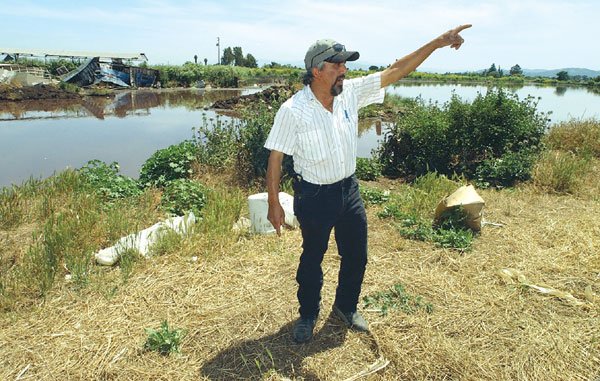Gilroy
– The Furtado Dairy Farm is under criminal investigation by the
Santa Clara County District Attorney and the California Department
of Fish and Game for spilling 240,000 gallons of waste water into
creeks east of Gilroy.
Gilroy – The Furtado Dairy Farm is under criminal investigation by the Santa Clara County District Attorney and the California Department of Fish and Game for spilling 240,000 gallons of waste water into creeks east of Gilroy.
The water, full of cow manure and chemicals harmful to fish and humans, traveled 4.5 miles through Alamias Creek, stopping short of Llagas Creek headwaters, south of Pacheco Pass Highway. Barring an unexpected rain, State Fish and Game Warden John Nores said the waste water will evaporate before it reaches the creek.
The spill was discovered Thursday afternoon when an anonymous caller tipped off the Santa Clara Valley Water District. Nores said the size of the spill indicated the dairy farm might have been pumping the water for several days.
“This is not the most severe I’ve seen but this is not a minor spill,” Nores said. “It was going a long time, at least a good portion of [Thursday] if not several days. There was enough water in that channel that I don’t think a reasonable effort was made to keep it retained.”
Dairy owner Manny Furtado said Friday that the spill was an accident. He said he was draining water from two retention ponds into a nearby field and was not aware the water was reaching a trench that runs along the field and feeds the Alamias. The Alamias feeds Jones Creek, which in turn feeds Llagas Creek, an anadromous, or migratory, channel for steelhead trout heading to the Pajaro River, according to Nores.
“I wasn’t doing it intentionally,” Furtado said. “I thought it was fine but there was a problem with the barrier. I’m not going to pump in that field anymore because I can’t have that happen.”
The Alamias stream heads south from Furtado Dairy, passes through a small residential community and alongside B&T Farms, a bell pepper grower. Paul Mirassou, pest control adviser for B&T, said Friday he’s known about discharge problems at Furtado, but is not worried they will affect his crops. Neighbors said Friday that Furtado’s ponds overflow into their yards whenever it rains.
“The odor and stink is terrible,” said George Ekberg of Dunlap Avenue. “When the rains come they figure they can dump whatever they want to and rain will wash it away. It washes across my property.”
Furtado milks about 350 cows at his Ferguson Avenue dairy. The dairy, one of two remaining in the county, has operated since 1964. The other dairy is a very small farm in San Martin. Nores said the amount of waste produced at dairies make them inherently dangerous to nearby waterways.
“Nothing against dairies, but any time you have a dairy on or connected to an anadromous fish stream, those are sensitive areas,” he said.
Fish and Game has no set guidelines about pumping retention ponds, but state law prohibits discharge of contaminants into state waterways at all but the lowest levels. Nores said state and county officials are testing the spill for nitrates, ammonia, pesticides, turbidity and sulfurs. He found no dead fish but said a similar spill in March or April could have had disastrous consequences for the steelhead trout in the Llagas.
“If this were to happen at migration time, it could be more of a problem,” he said. “Those fish need clean water to spawn and lay and hatch their eggs. [Sediment] suffocates egg laying stations.”
Water District Spokesman Mike DiMarco said a discrete spill doesn’t pose a grave threat to humans, but repeated discharge could contaminate the groundwater.
“It’s a big deal,” DiMarco said. “In the long term, if this kind of condition is allowed to occur over and over again it could affect the aquifer that we depend on for our drinking water.”
Furtado’s retention ponds hold water used to flush out waste from the dairy’s feed barns. In the dry season, the ponds evaporate and the sludge at the bottom is supposed to be carted to a landfill. But because of the long and heavy rainy season, Furtado’s ponds are full. He has a discharge permit with the Central Coast Regional Water Control Board, but it was unclear Friday whether he was in compliance.
Harvey Packard, an engineer with the regional board, said that Furtado was fined within the past year for not providing the board with information necessary to renew the discharge permit. Packard said Furtado has since been cooperative.
Furtado is facing a fine of as much as $25,000 a day for each day he was pumping and up to year in jail if found guilty of misdemeanor pollution charges. He also faces punishment from the regional board.
Santa Clara County Deputy District Attorney John Fioretta declined to comment on the investigation.














